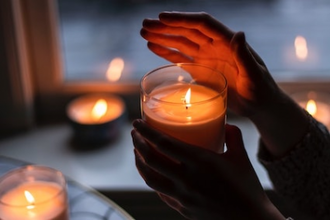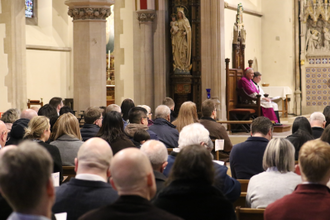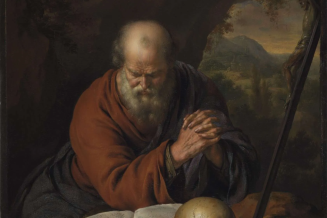Brother Herbert Kaden OSB - Obituary

Photo by Rebecca Peterson-Hall on Unsplash
Br Herbert Kaden OSB
25 January 1921 - 1 October 2022
Such a rich life - not in material possessions, far from it at times, but in love - there's no other word that sums it up, that constitutes this life so well-lived, that explains it: his ability that is to win and keep friends. It was a joy to watch initial meetings and to see immediate contact: eye to eye, heart to heart; the other person feeling immediately accepted and known. The bald outlines of his life can only capture some of this but re-reading his short autobiography one is struck by the lack of any unkind word and, though not without struggle, any bitterness.
Caring for Br Herbert over his last years meant hearing many of his stories many times over but always with the possibility of something new and always word-perfect, vouching for the accuracy of oral tradition. So he revisited his early childhood in Dresden - surrounded by an immensely cultured set of friends and family; so many names I subsequently delighted in dropping into the conversation, from such as Nicholas Pevsner to Romano Guardini, from Paul Tillich to a Professor Stepun who had been a member of the early revolutionary government of Kerensky in Russia, and so on. From this background grew Br Herbert's great love of languages and art, and of Eastern philosophy and religions. He was still learning to translate Lao Tzu's The Way even in his 101st year.
He even encountered Hitler several times and remembered him without anger, despite the huge disruption and pain this was to cause the family - of Jewish descent but largely assimilated to the German and Austrian culture in which they lived. No anger either towards his father Gerd Kaden who had left Lalla his mother so soon after his birth. All paving the way to that art of reconciliation to which he, consciously or not, devoted the rest of his life. Always then perhaps seeking integration and finding it in the constant retelling of his life. So he would return to those especially difficult moments: leaving Germany, finding himself classed as an enemy alien in a country he came to love - our country, this England and later especially the towns of Bristol and Cambridge and the countryside of Gloucestershire, Dorset and the Fens. I used to argue about the beauty of the latter but to a man who once defended flat roofs against pitched it was a hopeless cause. And this wasn't just an academic love but love learnt through the tilling of the soil, the milking of cows and once even driving cattle through the centre of Cambridge, and a great willingness to allow himself to be disciplined in various crafts. And so he learns to garden and to pot and even in his breakdown to allow the structure of his later life to emerge in the 'art therapy, basket making, carpentry and long country walks' which were staple fodder then but sadly lacking now in the re-habilitation of the mentally ill.
And so to a new chapter in which the gentle tug of faith begins to become more and more decisive: the call first to a firmer religious commitment and ultimately to the cloister. His mother's love of Meister Eckhart led the way, and several baptisms later (well, two) he enters the Roman Catholic Church: 'If Meister Eckhart could be a Catholic, then I could be too.' As so often, this path, and especially the path to monasticism, proved somewhat tortuous, his first call to being a potter at Prinknash being followed by the breakdown already mentioned and becoming a call instead to minister to the mentally ill and to many others who found themselves at the margins of society, a call which never left him. Indeed one wondered at times which was the stronger- being a monk or ministering to the poor. It was of course both and after many years as a gardener at St Edmund's House in Cambridge, where again he collected a vast variety of friends, and after the death of his beloved mother in 1971, he felt finally able - mind you at someone else's prompting - to seek monastic life at Prinknash in Gloucestershire. The rest they say is history with an eventual move to Turvey and a few battles on the way but finally gaining a great sense of peace and wholeness in his final years in a monastery with all the attributes he so much loved:- a farmyard, a garden, a pottery, a place for wayfarers, joyful worship in a mixed community, in a beautiful village in beautiful countryside, with a constant traffic of people of every stripe and denomination. These years also saw several visits to Dresden and reconciliation with his father and many wonderful holidays abroad, especially to his close friends Marc and Geraldine, and also twice to Stafford Whiteaker, now a hermit in the region of the Pyrenees. And we could go on to list so many other friends not least the many 'men of the road' with all their fascinating stories too.
A great man; greatly missed.















